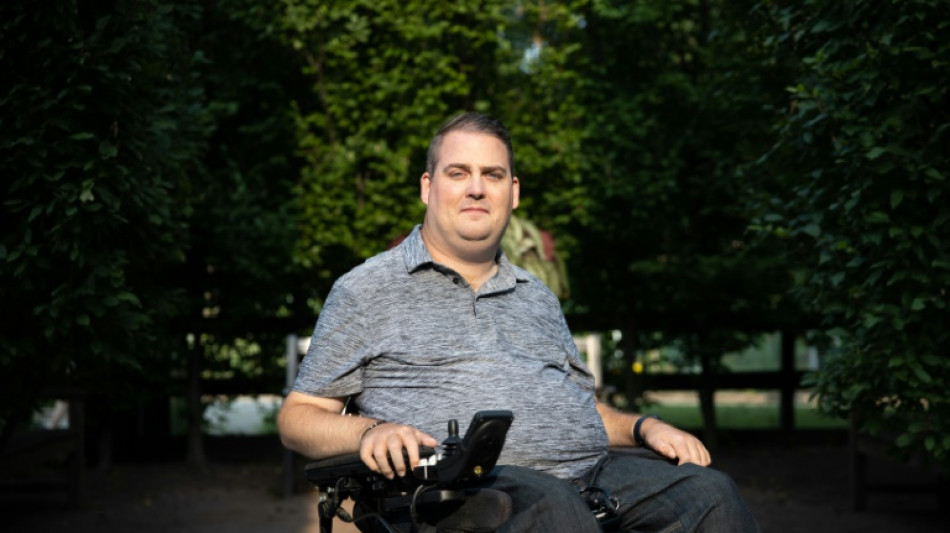
-
 Bangladesh launches campaigns for first post-Hasina elections
Bangladesh launches campaigns for first post-Hasina elections
-
Afghan resistance museum gets revamp under Taliban rule

-
 Multiple people missing in New Zealand landslips
Multiple people missing in New Zealand landslips
-
Sundance Film Festival hits Utah, one last time

-
 Philippines convicts journalist on terror charge called 'absurd'
Philippines convicts journalist on terror charge called 'absurd'
-
Anisimova grinds down Siniakova in 'crazy' Australian Open clash

-
 Djokovic rolls into Melbourne third round, Keys defence alive
Djokovic rolls into Melbourne third round, Keys defence alive
-
Vine, Narvaez take control after dominant Tour Down Under stage win

-
 Chile police arrest suspect over deadly wildfires
Chile police arrest suspect over deadly wildfires
-
Djokovic eases into Melbourne third round - with help from a tree

-
 Keys draws on champion mindset to make Australian Open third round
Keys draws on champion mindset to make Australian Open third round
-
Knicks halt losing streak with record 120-66 thrashing of Nets

-
 Philippine President Marcos hit with impeachment complaint
Philippine President Marcos hit with impeachment complaint
-
Trump to unveil 'Board of Peace' at Davos after Greenland backtrack

-
 Bitter-sweet as Pegula crushes doubles partner at Australian Open
Bitter-sweet as Pegula crushes doubles partner at Australian Open
-
Hong Kong starts security trial of Tiananmen vigil organisers

-
 Keys into Melbourne third round with Sinner, Djokovic primed
Keys into Melbourne third round with Sinner, Djokovic primed
-
Bangladesh launches campaigns for first post-Hasina polls

-
 Stocks track Wall St rally as Trump cools tariff threats in Davos
Stocks track Wall St rally as Trump cools tariff threats in Davos
-
South Korea's economy grew just 1% in 2025, lowest in five years

-
 Snowboard champ Hirano suffers fractures ahead of Olympics
Snowboard champ Hirano suffers fractures ahead of Olympics
-
'They poisoned us': grappling with deadly impact of nuclear testing

-
 Keys blows hot and cold before making Australian Open third round
Keys blows hot and cold before making Australian Open third round
-
Philippine journalist found guilty of terror financing

-
 Greenlanders doubtful over Trump resolution
Greenlanders doubtful over Trump resolution
-
Real Madrid top football rich list as Liverpool surge

-
 'One Battle After Another,' 'Sinners' tipped to top Oscar noms
'One Battle After Another,' 'Sinners' tipped to top Oscar noms
-
Higher heating costs add to US affordability crunch

-
 Eight stadiums to host 2027 Rugby World Cup matches in Australia
Eight stadiums to host 2027 Rugby World Cup matches in Australia
-
Plastics everywhere, and the myth that made it possible

-
 Interim Venezuela leader to visit US
Interim Venezuela leader to visit US
-
Australia holds day of mourning for Bondi Beach shooting victims

-
 Liverpool cruise as Bayern reach Champions League last 16
Liverpool cruise as Bayern reach Champions League last 16
-
Fermin Lopez brace leads Barca to win at Slavia Prague

-
 Newcastle pounce on PSV errors to boost Champions League last-16 bid
Newcastle pounce on PSV errors to boost Champions League last-16 bid
-
Fermin Lopez brace hands Barca win at Slavia Prague

-
 Kane double fires Bayern into Champions League last 16
Kane double fires Bayern into Champions League last 16
-
Newcastle pounce on PSV errors to close in on Champions League last 16

-
 In Davos speech, Trump repeatedly refers to Greenland as 'Iceland'
In Davos speech, Trump repeatedly refers to Greenland as 'Iceland'
-
Liverpool see off Marseille to close on Champions League last 16

-
 Caicedo strikes late as Chelsea end Pafos resistance
Caicedo strikes late as Chelsea end Pafos resistance
-
US Republicans begin push to hold Clintons in contempt over Epstein

-
 Trump says agreed 'framework' for US deal over Greenland
Trump says agreed 'framework' for US deal over Greenland
-
Algeria's Zidane and Belghali banned over Nigeria AFCON scuffle

-
 Iran says 3,117 killed during protests, activists fear 'far higher' toll
Iran says 3,117 killed during protests, activists fear 'far higher' toll
-
Atletico frustrated in Champions League draw at Galatasaray

-
 Israel says struck Syria-Lebanon border crossings used by Hezbollah
Israel says struck Syria-Lebanon border crossings used by Hezbollah
-
Snapchat settles to avoid social media addiction trial

-
 'Extreme cold': Winter storm forecast to slam huge expanse of US
'Extreme cold': Winter storm forecast to slam huge expanse of US
-
Jonathan Anderson reimagines aristocrats in second Dior Homme collection


From 'magical' to 'rip it out': different brain implant experiences
Ian Burkhart looked down at his hand and imagined closing it. To his amazement, it closed.
That moment, back in 2014, was the first time in history that a paralysed person had regained the ability to move their arm using just their thoughts -- with a little help from a device implanted in their brain.
"That was the magical moment that proved that this is possible, this isn't just science fiction," Burkhart said.
He had volunteered to be part of an experimental trial of a brain-computer interface (BCI), which connects human neural activity to technology.
The rapidly growing field, which includes leading BCI firms Synchron and Elon Musk's Neuralink, aims to use implants and algorithms to restore lost movement or communication and treat neurological disorders such as epilepsy.
But while some people enjoy the advantages of being plugged in to a computer, it can be traumatic for others.
Two people who had brain implants spoke to AFP about their different experiences.
- Nothing to be 'scared about' -
After a diving accident in 2010, doctors told Burkhart he was paralysed from the shoulders down.
"At 19, that was a big struggle to hear," Burkhart told AFP via a video call from his home in Columbus, Ohio in the United States.
So he leapt at the chance to be part of a trial called NeuroLife conducted by US non-profit firm Battelle that aimed to restore hand movement.
It involved invasive surgery to implant a pea-sized device containing around 100 electrodes near his brain's motor cortex, which controls movement.
The device recorded his brain activity, sending it to a computer which used an algorithm to decipher exactly how he wanted to move his hand.
That message was then relayed to an electrode sleeve on his right forearm which stimulated the relevant muscles.
Over time, Burkhart became so adept that he was able to tap out guitar solos on the video game Guitar Hero.
But after seven and a half years, funding for the trial ran out, and he had to have the device removed in 2021.
"It definitely was a sad time," said Burkhart, now 32.
The blow was softened by the fact that he was only ever able to use the technology in the lab, which he visited a couple of times a week.
His scalp had also become infected.
"The device is screwed into your skull" with a connector sticking out, leaving an "open wound", he said.
"Your scalp is trying to close the whole time -- but it can't because there's a piece of metal in the way."
Despite the trial's end, Burkhart is positive about the experience.
He has become an advocate for BCIs, pushing for the experience of patients to be prioritised.
"The actual truth of using these devices right now is they can do a lot less than what a lot of people are thinking," he said, adding that it was not something that people need to be "scared about".
"I look forward to getting some sort of device in the future," he said, adding that next time he would prefer one that is permanently implanted.
- 'Weird robot inside me' -
Hannah Galvin was far less enthusiastic.
At the age of 22, the Australian had seen her dreams of becoming a ballet dancer dashed by crippling epileptic seizures, when she was offered the chance to get a brain implant to help treat the condition.
"I would have done anything. It seemed like an opportunity to get my life back," Galvin, now 35, said from the Australian state of Tasmania.
An electroencephalography (EEG) device, which records electrical activity, was implanted into her brain as part of a trial by the US company NeuroVista.
The idea was that the device would warn Galvin if she was about to have a seizure, giving her time to prepare.
But after being implanted, the device went off almost constantly, leading Galvin to believe it was malfunctioning.
It was not. It turned out she was having more than 100 seizures a day. Galvin and her doctors had no idea they struck so often.
She felt embarrassed in public by the constant flashing and beeping of the device.
"I started to regret the whole thing," she said.
There was a growing feeling that "there's somebody in my head and it's not me", she said.
"It was this weird robot inside me, and I really wanted to just rip it out of my head," she said.
"There was so much relief" when she had the device removed, she added.
But the experience shook her confidence and she no longer wanted to leave home. She was soon prescribed anti-depressants.
While it took years for Galvin to accept that her seizures would make it too difficult to work, she said she now has a "happy life" painting and taking photographs in the countryside of northern Tasmania.
For people considering brain implants, she advised them to "be more wary than I was".
I.Meyer--BTB



